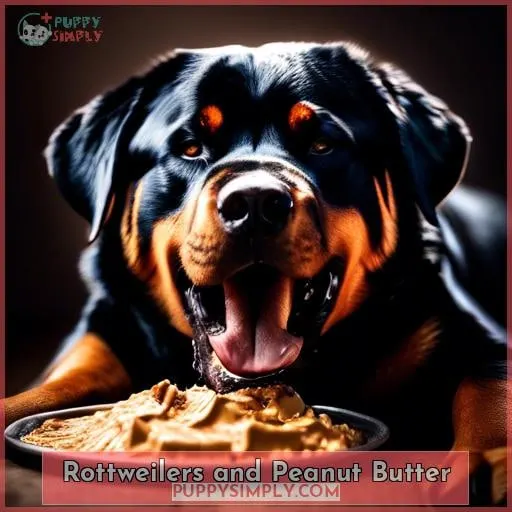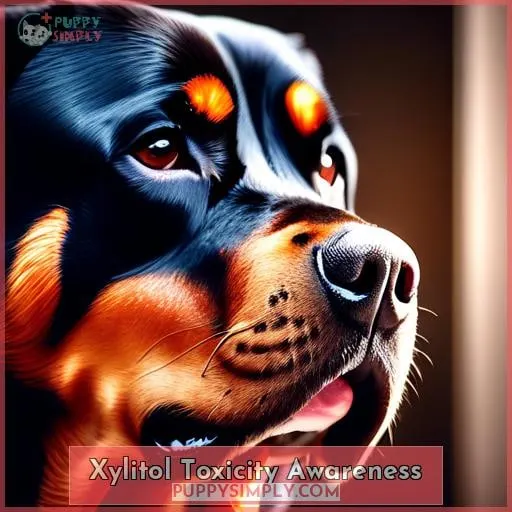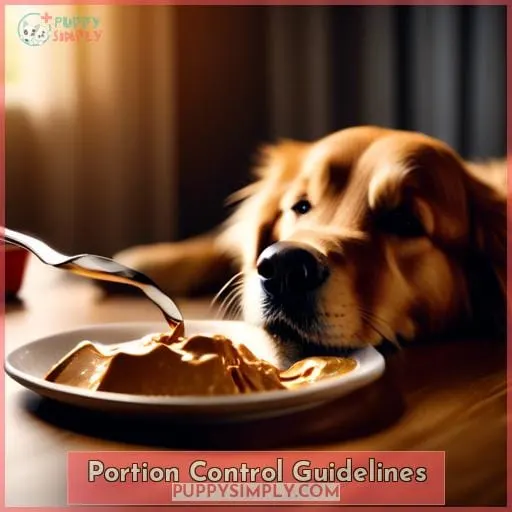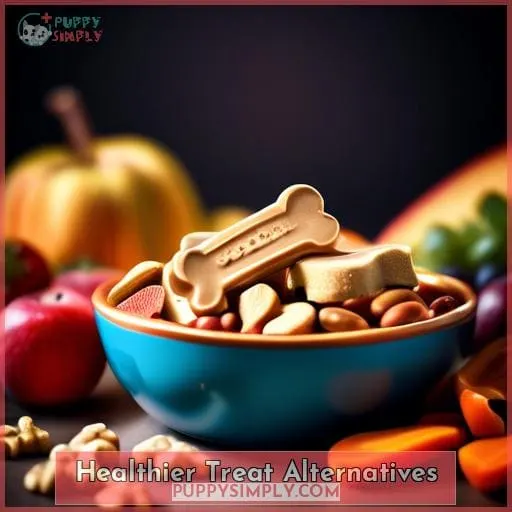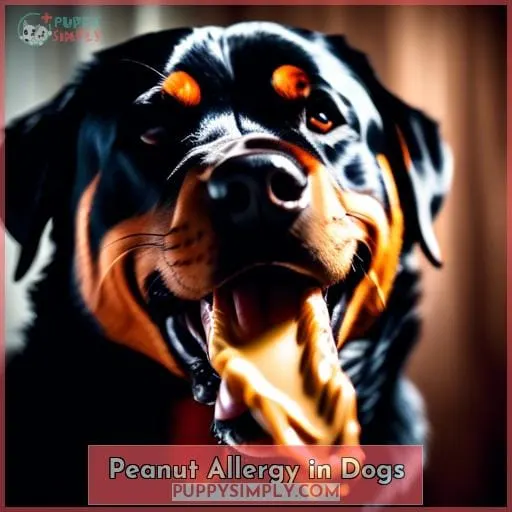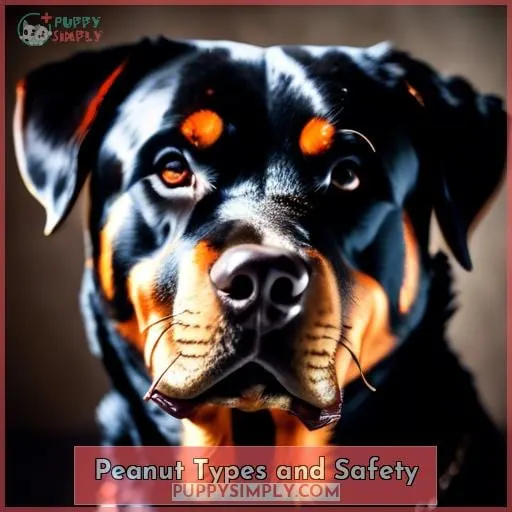This site is supported by our readers. We may earn a commission, at no cost to you, if you purchase through links.

You’re aiming for joy, not jeopardy. Ensuring the peanut butter is xylitol-free and served in moderation turns a simple snack into a safe indulgence.
Fostering a sense of belonging and understanding between you and your loyal companion, can Rottweilers eat peanut butter? Absolutely, with mindful choices.
Table Of Contents
- Key Takeaways
- Rottweilers and Peanut Butter
- Safe Peanut Butter Choices
- Xylitol Toxicity Awareness
- Portion Control Guidelines
- Healthier Treat Alternatives
- Peanut Allergy in Dogs
- Peanut Types and Safety
- Peanut Butter as a Training Aid
- Special Considerations
- Emergency Response
- Frequently Asked Questions (FAQs)
- How can I introduce peanut butter to a Rottweiler with a sensitive stomach?
- Are there any specific brands of peanut butter that are recommended for Rottweilers with a history of food allergies?
- Can Rottweiler puppies have peanut butter, and if so, at what age is it safe to introduce it?
- How does peanut butter affect the dental health of Rottweilers?
- Are there any homemade peanut butter recipes that are tailored for a Rottweiler’s dietary needs?
- Conclusion
Key Takeaways
- Rottweilers can safely enjoy peanut butter in moderation, provided it does not contain xylitol, a sweetener toxic to dogs. Opt for unsalted, homemade, or dog-specific peanut butter to avoid health risks like obesity and pancreatitis.
- Peanut butter is a nutritious treat for Rottweilers, offering essential nutrients such as protein, healthy fats, vitamins B and E, and niacin. It can be used as a high-value reward during training and to provide mental stimulation when used in puzzle toys.
- Owners should be vigilant about the amount of peanut butter their Rottweilers consume to prevent health issues. Treats, including peanut butter, should not exceed 10% of a dog’s diet. Consulting a veterinarian can help determine the appropriate amount based on the dog’s size and health condition.
- It is crucial to check peanut butter labels for xylitol, a common sugar substitute in sugar-free products that is highly toxic to dogs. Ingestion of xylitol can lead to hypoglycemia and be life-threatening, requiring immediate veterinary attention if suspected.
Rottweilers and Peanut Butter
You might be wondering if your Rottweiler can enjoy peanut butter just like other dogs. The answer is yes, Rottweilers can have peanut butter as long as it’s the right kind and given in moderation.
Peanut butter can offer your Rottweiler essential nutrients like protein, healthy fats, and vitamins B and E.
However, it’s important to choose unsalted and xylitol-free options to avoid health risks. Always check the label for harmful ingredients and consult your vet to determine the appropriate amount for your dog’s size and health status.
Nutritional Benefits
In accordance with your dog’s dietary needs, peanut butter can offer substantial nutritional benefits, including essential protein, healthy fats, and vitamins such as B6 and E, which are crucial for maintaining your Rottweiler’s overall health.
- Nutritional benefits: A source of niacin and essential amino acids.
- Taste preferences: Most dogs love the taste, making it a high-value treat.
- Digestive health: In moderation, it supports a balanced diet.
- Behavioral enrichment: Useful in puzzle toys to stimulate your dog’s mind.
- Training rewards: Ideal for positive reinforcement during training sessions.
Potential Risks
While peanut butter can be a tasty treat for your Rottweiler, you’ve got to watch out for potential risks like obesity and pancreatitis due to its high fat content.
Moderation advice is key to maintaining your dog’s nutritional balance and digestive health.
Be vigilant about allergy management, especially with peanuts that may contain aflatoxin.
Always opt for dog-specific peanut butter to avoid xylitol poisoning and trans-fatty acids.
Weight monitoring is crucial to prevent health issues, ensuring your Rottweiler enjoys a long, happy life.
Safe Peanut Butter Choices
When considering peanut butter for your Rottweiler, it’s crucial to choose wisely to ensure their health and safety.
Opt for unsalted and homemade varieties to avoid harmful additives and excessive sodium, which can be detrimental to your dog’s well-being.
These options not only provide a safer treat but also offer essential nutrients beneficial for your Rottweiler’s diet.
Unsalted and Homemade
Transitioning from the general benefits and risks of feeding Rottweilers peanut butter, you’ll find that unsalted and homemade varieties offer the safest options for your pet.
- Unsalted Benefits: No added sodium, reducing health risks.
- Homemade Goodness: Control over ingredients ensures no harmful additives.
- Rottweiler Preferences: Tailor flavors to your dog’s liking, avoiding allergens.
- Nutritional Caution: Balance treats with regular diet to prevent obesity.
Choosing unsalted and homemade peanut butter prioritizes your Rottweiler’s health, catering to their preferences while exercising nutritional caution.
Avoiding Additives
Choose peanut butter options that are free of additives and sweeteners to ensure your dog’s treat is both safe and healthy. When selecting peanut butter, practice Additive Awareness by reading labels closely.
Opt for Healthy Options like unsalted and homemade varieties, which let you control what goes into your dog’s treats.
Nutritional Caution is key; too much can lead to health issues.
Ingredient Scrutiny helps avoid food allergies and risks associated with certain additives.
Xylitol Toxicity Awareness
When offering peanut butter to your Rottweiler, it’s crucial to ensure it’s free of xylitol, a sweetener deadly to dogs. Ingesting even small amounts can cause symptoms like vomiting, weakness, and loss of coordination.
Always check labels and contact your vet immediately if you suspect xylitol poisoning.
Identifying Xylitol
You’ll need to check the ingredient list on peanut butter jars to ensure they’re free of xylitol, a sweetener that’s highly toxic to dogs.
- Identifying Xylitol: Look for xylitol in the ingredients; it’s sometimes listed under other names like birch sugar.
- Xylitol-Free Brands: Research brands known for not using xylitol.
- Xylitol Poisoning Signs: Be aware of symptoms like weakness and seizures.
- Xylitol Awareness: Educate your family on the dangers of xylitol.
- Dog Safe Sweeteners: Choose products with dog-safe alternatives.
Symptoms of Poisoning
After identifying xylitol in your Rottweiler’s peanut butter, it’s crucial you’re aware of the symptoms of poisoning this sweetener can cause. Early intervention and understanding the risks are key to ensuring your dog’s safety.
Monitoring signs closely allows for timely veterinary care, which can be life-saving.
| Symptom | Impact | Action |
|---|---|---|
| Weakness | Immediate concern | Seek veterinary care |
| Lack of Coordination | Indicates poisoning | Prompt treatment options |
| Seizures | Severe risk | Emergency intervention |
| Collapse | Critical condition | Urgent preventive measures |
Portion Control Guidelines
When considering peanut butter as a treat for your Rottweiler, it’s crucial to follow the 10 percent rule, ensuring treats don’t exceed 10% of their daily diet.
This guideline helps maintain a balanced diet and prevents obesity.
Treat frequency should be moderated; too many high-calorie treats like peanut butter can lead to health issues.
The 10 Percent Rule
When adhering to the 10 percent rule, it’s important to ensure that treats, including peanut butter, don’t exceed one-tenth of your Rottweiler’s total daily caloric intake.
Consulting a veterinarian can provide insight into your dog’s specific needs.
Treat Frequency
While adhering to the 10 percent rule for treat intake, it’s important to consider how often you’re offering peanut butter to your Rottweiler.
Frequent treats, even healthy ones like peanut butter, can disrupt their diet balance, affecting blood sugar levels and potentially leading to weight gain. To minimize risks and maximize benefits, establish a treat frequency that supports their well-being, keeping an eye out for any allergic reactions.
This approach ensures your Rottweiler enjoys their treats without compromising their health.
Healthier Treat Alternatives
When considering healthier treat alternatives for your Rottweiler, it’s essential to explore dog-friendly fruits and vegetable snacks. These options not only provide a nutritious supplement to their diet but also introduce variety and enjoyment.
Fruits like apples (without the core and seeds) and vegetables such as carrots and green beans are low in calories and high in fiber. Making them excellent choices for keeping your Rottweiler both healthy and satisfied.
Dog-Friendly Fruits
Your Rottweiler’s treat regimen can be diversified with dog-friendly fruits, which offer a variety of vitamins and fiber while being a low-calorie snack option.
- Apples (sans seeds and core) provide crunch and vitamin C.
- Blueberries are antioxidant-rich and perfect for training rewards.
- Bananas, in moderation, add potassium and sweetness to their diet.
- Watermelon (seedless) is hydrating and full of vitamins A, B6, and C.
These fruits are healthy treat options that ensure fruit safety for dogs and add canine dietary variety.
Vegetable Snacks
Transitioning from the sweet and tart delights of dog-friendly fruits, you’ll find that vegetable snacks offer a crunchy, nutrient-packed alternative.
Canine Crunch: Dog-friendly veggies like carrots and green beans are low in calories and high in fiber, making them excellent for your Rottweiler’s health.
Butter Balance: Managing peanut intake is crucial, as too much can lead to weight gain.
Xylitol Watch: Always check for hidden dangers like xylitol in treats.
Paw-some Portions: Offer treat size tips to maintain a healthy diet.
Beyond Butter: Explore diverse treat options to keep your dog’s diet varied and nutritious.
Peanut Allergy in Dogs
When introducing peanut butter to your Rottweiler, it’s crucial to watch for any signs of an allergic reaction, which can range from mild to severe.
Chronic allergies may manifest as ongoing skin irritations or gastrointestinal issues, while acute reactions could include more immediate symptoms like hives or swelling.
If you notice any unusual signs after your dog consumes peanut butter, such as itching or digestive upset, it’s important to consult your veterinarian.
Recognizing Allergic Reactions
Recognizing allergic reactions in dogs to peanut butter involves observing symptoms such as red and itchy skin, excessive licking, and difficulty breathing. If your Rottweiler shows these signs, it’s crucial to consider treatment options promptly.
Allergy management often includes dietary adjustments, removing peanuts and peanut butter from their diet. Preventive measures, like avoiding peanut shells and lectins, can safeguard your dog.
Opt for peanut butter free of sugar and additives to minimize risks. Always consult a vet for tailored advice on managing allergic reactions.
Chronic Vs. Acute Allergies
When discussing the distinction between chronic and acute allergies in dogs, it’s important to understand that chronic allergies persist over time, often requiring ongoing management. Chronic allergies might need tailored diets or immunotherapy options, possibly including omega-3 supplements to reduce inflammation.
Acute allergies manifest suddenly and can be more severe in nature. Acute reactions, especially from flavored nuts or peanut butter, demand immediate attention.
Recognizing allergic reactions early and understanding whether they’re chronic or acute helps ensure your dog lives a happy, healthy life free from discomfort.
Peanut Types and Safety
When considering peanut butter for your Rottweiler, it’s crucial to select safe varieties and be mindful of potential choking hazards. Unsalted, plain peanut butter without xylitol is the healthiest choice for your dog, providing essential nutrients like protein, healthy fats, and vitamins.
However, moderation is key, as excessive consumption can lead to obesity and other health issues.
Always ensure the peanut butter you choose doesn’t contain xylitol, a toxic sweetener for dogs, and consult your veterinarian to determine the appropriate amount for your Rottweiler’s diet.
Safe Peanut Varieties
In today’s discussion on safe peanut varieties for dogs, it’s crucial to understand that not all peanuts are created equal. Opt for unsalted, dry-roasted peanuts or homemade preparations to avoid harmful additives.
When choosing commercial brands, scrutinize ingredient labeling closely; sugar-free products might contain xylitol, which is toxic.
Homemade recipes for peanut butter, free from jelly and sweeteners, are safest.
For a fun twist, stuff a treat toy with your homemade peanut butter mix.
Choking Hazards
Frequently transitioning from discussing safe peanut varieties, it’s crucial you’re always vigilant about the potential choking hazards associated with feeding peanuts to your dog.
- Prevention Strategies: Always remove shells and choose smooth peanut butter over chunky to minimize risks.
- Heimlich Maneuver: Learn this life-saving technique in case your dog shows signs of choking, such as lack of coordination or distress.
- Training Techniques: Teach your dog to eat slowly, possibly using special feeding toys that dispense peanut butter gradually.
- Supervision Guidelines: Never leave your dog unattended while they’re enjoying their peanut or pb&j treat, ensuring immediate action can be taken if needed.
Peanut Butter as a Training Aid
Peanut butter can be used as a training aid for your Rottweiler, as it’s a treat that most dogs find irresistible. When used in moderation and ensuring it’s free from xylitol and low in sodium, peanut butter can be a healthy reward that aids in positive reinforcement during training sessions.
It’s also useful for keeping your dog engaged when st■ into interactive toys, making training both fun and rewarding.
Interactive Toys
Using peanut butter as a training aid, you can fill interactive toys to keep your Rottweiler engaged and mentally stimulated. These enrichment activities foster a sense of belonging and understanding between you and your furry friend.
Canine amusement is essential for their well-being, and playful learning through engagement strategies like puzzle feeders or treat-dispensing toys can provide hours of fun.
| Enrichment Activities | Benefits |
|---|---|
| Puzzle Feeders | Sharpens problem-solving skills |
| Treat Balls | Encourages physical activity |
| St■ Kongs | Satisfies natural foraging instincts |
| Tug Toys with Pockets | Strengthens bond during play |
| Snuffle Mats | Enhances olfactory enrichment |
Reward-Based Training
Following the use of interactive toys, incorporating peanut butter as a reward in training can significantly enhance your Rottweiler’s learning experience. This method taps into positive reinforcement, a cornerstone of effective training techniques.
By offering a lick of peanut butter, you’re not just rewarding good behavior. You’re fostering interactive engagement and strengthening the bond between you and your pet.
Behavioral conditioning with such high-value treats accelerates canine education.
Special Considerations
When considering whether Rottweilers can eat peanut butter, it’s important to be mindful of their specific health needs and weight management. If your Rottweiler has any health conditions, especially those affecting their digestion or metabolism, consult your vet before introducing peanut butter to their diet.
While peanut butter can be a tasty treat, it’s high in calories and should be given in moderation to prevent obesity, which can lead to other health issues.
Dogs With Health Conditions
When transitioning from discussing peanut butter as a training aid to addressing dogs with health conditions, it’s crucial to consider that if your dog has specific health issues, you’ll need to be extra cautious with their diet, including the use of peanut butter as a treat.
Dietary restrictions may be necessary, and nutritional counseling can guide you toward safe treatment options.
Embrace lifestyle modifications and a holistic approach to ensure your Rottweiler thrives despite any health challenges, always prioritizing their well-being and happiness.
Weight Management
One must consider their Rottweiler’s caloric needs when incorporating peanut butter into their diet, as its high fat content can contribute to weight gain if not managed properly.
Ensure dietary balance by complementing peanut butter treats with a consistent exercise regimen. Portion monitoring is key; use peanut butter sparingly and within the 10 percent treat guideline.
This approach supports a healthy lifestyle for your Rottweiler, keeping them fit and satisfied.
Emergency Response
If your Rottweiler has ingested peanut butter containing harmful substances like xylitol, it’s crucial to act swiftly. Contact your veterinarian immediately as xylitol poisoning can rapidly lead to severe health issues, including hypoglycemia and liver failure.
Monitoring your dog for symptoms such as weakness, lack of coordination, or seizures is essential for timely intervention.
Ingesting Harmful Substances
Vigilance in monitoring what your Rottweiler consumes is crucial. Ingestion of harmful substances like xylitol can lead to emergency situations requiring immediate veterinary care.
If you suspect your pet has eaten toxic substances, act fast and seek emergency care.
Preventive measures, such as keeping sweets out of reach, are key. Always consult your vet for advice on safe treats to ensure your Rottweiler’s health and happiness.
Veterinary Intervention
If you suspect your dog has ingested xylitol or is showing signs of poisoning, it’s crucial to seek veterinary care immediately to prevent potentially fatal consequences.
A prompt veterinary consultation can be the difference between life and death.
Your vet will guide you through emergency response steps and provide treatment for xylitol poisoning.
Always be prepared to act swiftly and protect your beloved Rottweiler’s health with immediate veterinary intervention.
Frequently Asked Questions (FAQs)
How can I introduce peanut butter to a Rottweiler with a sensitive stomach?
Start by offering a small lick of unsalted, xylitol-free peanut butter to your Rottweiler.
Monitor for any signs of digestive upset and gradually increase the amount if well-tolerated.
Are there any specific brands of peanut butter that are recommended for Rottweilers with a history of food allergies?
Choose peanut butter brands like Whole Foods 365, Trader Joe’s No Salt, or Poochie Dog Peanut Butter for your Rottweiler with allergies.
Whole Foods 365 offers an Organic Creamy Peanut Butter that is unsweetened and contains no salt, listing only organic dry roasted peanuts as its ingredient. Trader Joe’s provides an Organic Creamy Salted Valencia Peanut Butter, made with just peanuts and salt, ensuring simplicity and safety for your dog.
Poochie Dog Peanut Butter includes ingredients like dry roasted peanuts, turmeric, parsley, ginger, and coconut oil, making it a healthy choice for dogs.
These brands are recommended because they are free of xylitol, a sweetener that is toxic to dogs, and other harmful additives. They provide a source of protein and healthy fats, important for your dog’s diet, but should be given in moderation due to their high calorie content.
Always check the label to ensure the peanut butter does not contain xylitol or unnecessary additives.
Can Rottweiler puppies have peanut butter, and if so, at what age is it safe to introduce it?
Rottweiler puppies can have peanut butter from 6 weeks old in moderation.
Ensure it’s xylitol-free and given as an occasional treat.
How does peanut butter affect the dental health of Rottweilers?
Peanut butter can stick to Rottweilers’ teeth, potentially contributing to dental plaque and tartar buildup.
It’s essential to maintain oral hygiene with regular brushing and dental check-ups.
Are there any homemade peanut butter recipes that are tailored for a Rottweiler’s dietary needs?
Whip up a storm of love with a homemade peanut butter recipe for your Rottweiler. Blend unsalted peanuts and a dash of affection, ensuring the harmful xylitol is absent from the mix.
Conclusion
Peanut butter can be a delightful treat for your Rottweiler, but it’s crucial to choose wisely and serve sparingly. Ensure it’s xylitol-free and moderation is key to keep your companion healthy and happy.
With these guidelines, you can confidently include peanut butter in your Rottweiler’s diet as an occasional, tasty reward.

